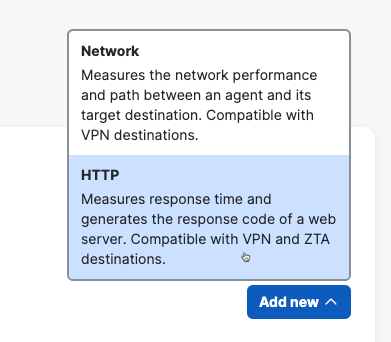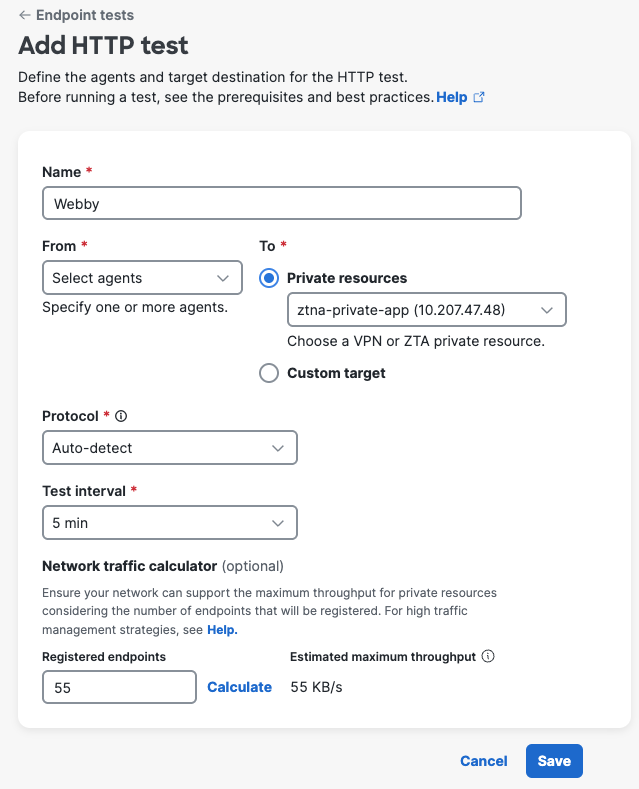Create HTTP Server Tests
HTTP server tests measure the response time and generate the response code of a web server. They are compatible with VPN and ZTA destinations.
Prerequisites
- Endpoints must have requisite permissions to access the test's target application. For more information, see Manage Access Policies.
- Endpoints must meet testing capacity requirements. For more information, see Endpoint Agent Licensing.
Zero Trust Access prerequisites:
- Endpoints must meet Zero Trust Access posture-profile requirements. For more information, see Manage Zero Trust Access Posture Profiles.
- End users must be enrolled in Zero Trust Access and must be signed into their OS.
- Strongly recommended: When testing private resources, turn off the user-authentication interval to prevent end users from receiving unexpected notifications. You must turn off the user authentication globally and for the specific HTTP server test. For more information, see: Rule Defaults: Default Settings for Access Rules and Network Requirements for Zero Trust Access.
Procedure
Strongly recommended: Before running large-scale tests, run a test with a small subset of agents to ensure that your network can support the test traffic between Secure Access and your on-premise environment.
- In Secure Access, navigate to Experience Insights > Insights Management>Endpoint tests.
- Above the Endpoint tests table, click Add new > HTTP.

- Define the agents and target destination under Add HTTP test.

- Name —Enter a name that identifies the agent-to-server test (such as target domain name or IP address).
- From —Specify one or more agents or groups of agents by location.
- If you select all agents from a given location, the test will be associated with the agents that are currently present for that location.
- If a new agent becomes available for the location when the test is run, the agent won't be included in the test. To add the new location, create a new test or clone the existing test.
- A single synthetic test is limited to a maximum of 150,000 endpoint agents.
- To
- Private resource: Choose an IP address from the dropdown. VPN and ZTA are supported.
- Custom target: Specify a Web URL.
- Protocol:
- Auto-detect—The default and recommended option. Auto-detect tries several probes to identify the best test method for the device's current network conditions.
- ICMP
- ICMP + TCP Connect—Enables a TCP connection with a 10-second timeout and closes the connection if it is unable to connect. Unsuccessful connections count towards the TCP-connection failures metric.
- Prefer TCP (ICMP fallback)
- TCP
- Test interval—Select the frequency of the test run.
- The Network traffic calculator is available to help you ensure your network can support the maximum throughput for private resources considering the number of endpoints that will be registered.
- The calculator assumes all endpoints run the test at the same time. Actual testing may distribute network traffic over the test interval configured above.
- For high traffic management strategies, see Estimate Peak Traffic to Custom Targets for Default Endpoint Tests.
- Click Save test.
Important
Before running large-scale tests, run a test with a small subset of agents to ensure that your network can support the test traffic between Secure Access and your on-premise environment.
Estimate Peak Traffic to Custom Targets for Default Endpoint Tests < Create HTTP Server Tests > Create Network Tests
Updated about 1 month ago
